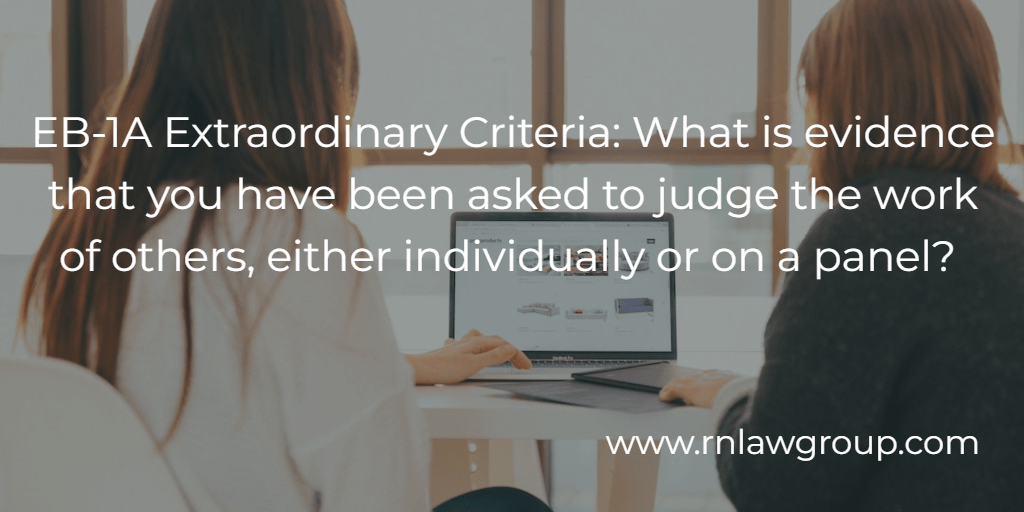
EB-1A Extraordinary Criteria: What is evidence that you have been asked to judge the work of others, either individually or on a panel?
The EB-1A employment-based immigration visa can appear to be a daunting process. An applicant must either show proof of a one-time achievement (major internationally-recognized award) meet 3 of the 10 listed criteria:
- Evidence of receipt of lesser nationally or internationally recognized prizes or awards for excellence
- Evidence of your membership in associations in the field which demand outstanding achievement of their members
- Evidence of published material about you in professional or major trade publications or other major media
- Evidence that you have been asked to judge the work of others, either individually or on a panel
- Evidence of your original scientific, scholarly, artistic, athletic, or business-related contributions of major significance to the field
- Evidence of your authorship of scholarly articles in professional or major trade publications or other major media
- Evidence that your work has been displayed at artistic exhibitions or showcases
- Evidence of your performance of a leading or critical role in distinguished organizations
- Evidence that you command a high salary or other significantly high remuneration in relation to others in the field
- Evidence of your commercial successes in the performing arts
These criteria can make even very well qualified candidates nervous about their eligibility, but with the right experience, the right lawyer, and a little luck, an applicant can have their Green Card in as little as three months. This series of articles will provide a background on each of the 10 criteria, examples of documents that can meet them, and common pitfalls to avoid.
The judging criteria can seem pretty straightforward, but there are some hidden pitfalls that needed to be avoided. Meeting this criterion can be done through a variety of experiences. Conducting performance reviews, project reviews, assessments, judging in competitions, or reviewing manuscripts or articles can all be used to meet this criterion. Consulting with an experienced lawyer can help you examine your career history to identify compatible judging experiences.
At times, USCIS has tried to claim that judging in the course of a job, such as performance reviews or project reviews cannot be used to meet this criterion. However, there have been repeated lawsuits filed over this issue and judges have repeatedly ruled that judging done in the performance of job duties can meet this criterion.
Now once you have identified instances of judging, you can turn to the task of providing documentary evidence of the judging. There are two primary areas that evidence should cover; proof that you have been asked to judge the work of others and proof that you carried out the judging. Proof that you have been asked to be a judge can take the form of emails requesting you review something or formal invitations to be a judge. The proof that you actually were a judge can take numerous forms. It can be as simple as an email with your feedback or it can be a formal grading done via a rubric. Additionally, if the judging is being done formally, there will usually be documentation of judging criteria that the judge must follow. For instance a judge would have to provide a grade in a specific criteria and a score between 1 – 5. A copy of this rubric would serve as excellent evidence.
In addition to the documentation of judging, a support letter discussing the judging can be very helpful. The letter can discuss specifics on what was being judged, how it was being judged, and what the impact of the judging was.
With the support of an experienced and skilled lawyer, the judging criteria can be met through a straightforward process. For more questions, please consult an experienced immigration attorney.
Karim Jivani is a Special Attention Staff Attorney at Reddy Neumann Brown PC who focuses on employment-based non-immigrant visas. Karim’s practice covers all phases of the visa process including filing petitions, responding to Requests for Evidence (RFE), and drafting motions and appeals. He has completed over 30 RFE’s to date in response to H-1B, L-1, I-140, and VAWA petitions.

